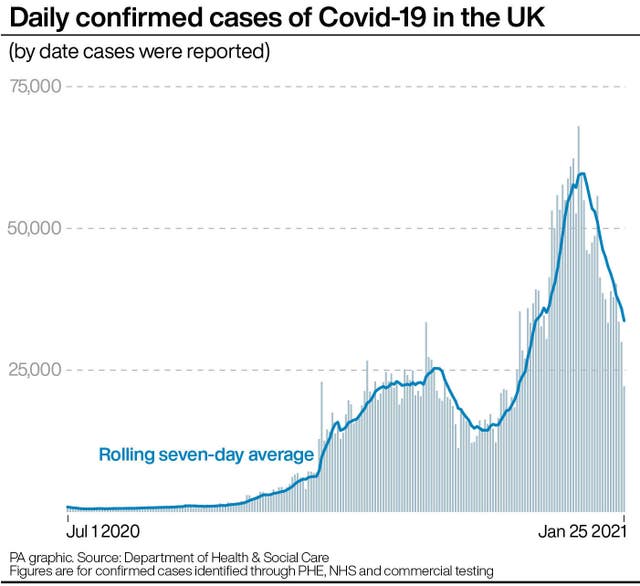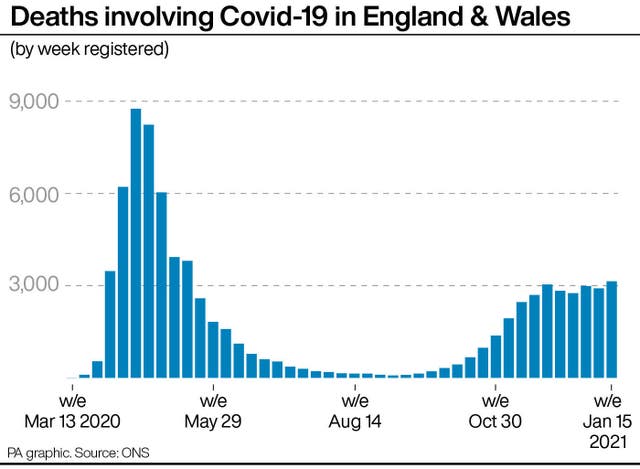Quarantine hotels set to be introduced to limit spread of coronavirus variants
Vaccines Minister Nadhim Zahawi said an announcement on the plans would be made later.

Passengers arriving in England from high-risk coronavirus hotspots look set to be made to quarantine in hotels to limit the spread of new variants.
Prime Minister Boris Johnson will discuss the proposals – designed to ensure people follow self-isolation rules – with senior ministers at the “Covid Operations” committee on Tuesday.
Vaccines Minister Nadhim Zahawi warned that the country needs to be “very careful” as new strains emerge, and said an announcement on the quarantine plans would be made later.
He told Sky News: “There will be an announcement on this issue later on today, so I can only say to you that it is the right thing to do, because I am the Vaccines Minister, that as we vaccinate more of the adult population, if there are new variants like the South African or the Brazilian variants, we need to be very careful.
“We acted on those very quickly and of course dealt with travel from those countries, and from Portugal and elsewhere, rapidly so it is important we continue to review our border policy and an announcement will be made when a decision has been taken.
“And of course the industry itself will be engaged with heavily, including (Health Secretary) Matt Hancock engaging with the industry to explain the decision making at health, as well as of course the business department with the Business Secretary.”
Home Secretary Priti Patel declined to comment on “speculation” about quarantine hotels as she answered an urgent question in the Commons.
But she said the Government “will not hesitate to take further action” to protect the UK from new strains, and said “measures are always under review”.
Shadow home secretary Nick Thomas-Symonds said Labour wanted a “comprehensive hotel quarantine system with protections to secure us against new strains”.
Despite reports suggesting it could take up to three weeks to implement the policy – partly due to the logistical challenge of arranging accommodation for thousands of arrivals – the head of a major hotel chain said they could mobilise “within 24 to 48 hours”.
Rob Paterson, chief executive of Best Western Great Britain, told BBC Breakfast: “Through our project with the NHS supporting discharge patients, we’ve got the protocols and the whole infection control management side of things taken care of.
“We could turn this around within 24 to 48 hours for an open hotel, and a bit longer for an unopened hotel.”

Various options for quarantining arrivals are said to be on the table, but Whitehall sources suggested that ministers may opt for a more limited system after aviation leaders warned that introducing tougher border rules would be “catastrophic” for the industry.
In a joint statement, the Airport Operators Association and Airlines UK insisted the country already has “some of the highest levels of restrictions in the world” and that introducing tougher rules would be “catastrophic”.
Reports have suggested that arrivals in England would have to cover the price of quarantining in hotels for 10 days, potentially setting them back more than £1,000.
The BBC said the requirement to isolate in a hotel would apply to arrivals from most of southern Africa and South America, as well as Portugal.
However, Conservative former health secretary Jeremy Hunt said the proposals might need to go further than applying only to those arriving from countries where new variants of Covid-19 have been discovered.

Pressed on whether he supports a universal approach to quarantining international arrivals, Mr Hunt told BBC Radio 4’s Today programme: “I think it is a big logistical exercise to do that and it is not going to be possible to do it overnight anyway.
“But I think the real question is buying us enough time, and we don’t know which countries these variants are arising in. We have much better genomic sequencing in this country than in most other countries – in fact, any other country – so we are better at tracing these things than other places.
“But I think we just have to be very cautious, because if we can get this vaccine distribution up to sufficient levels, we can really cut down the transmission in this country and transform the battle against the virus.
“If we do have to go further, I hope it would only have to be for a temporary period.”
Ministers in Northern Ireland are expected to discuss the issue of quarantine at a Stormont Executive meeting on Tuesday.
In Scotland, Deputy First Minister John Swinney said the Scottish Government would “go at least as far” as England in enhancing quarantine arrangements.
There is no direct route into Wales for international travellers at present, but a Welsh Government spokesman said they expected to discuss the plans with the UK Government in more detail.
Direct flights to the UK from South Africa, Brazil and Portugal have already been suspended, but British residents have been permitted to return through indirect routes and then self-isolate at home.
Australia became one of the first countries to introduce mandatory hotel quarantine in March, while the practice is also observed in China, New Zealand, India, Singapore, the Philippines, Taiwan, Qatar and Thailand.
In other developments:
– Mr Johnson will lead a Downing Street press conference at 5pm alongside England’s chief medical officer Professor Chris Whitty and NHS England boss Sir Simon Stevens.
– Mr Zahawi said he was “confident” that the Pfizer vaccine supply would continue – despite the European Union threatening to impose tight controls on the export of coronavirus jabs made in the bloc.
– Official data showed hospital admissions of people with Covid-19 in England have dropped to the lowest daily figure reported since New Year’s Eve.
– But 37,000 people remained in hospital with coronavirus, almost twice the peak in the first wave in April, with more people on ventilators than at any time in the pandemic.
– More than 6.4 million coronavirus vaccinations have taken place in England as of Monday, up 236,177 on the previous day’s figures.
– The Office for National Statistics revealed the unemployment rate reached 5% in the three months to November for the first time since early 2016 after another 202,000 people lost their jobs.
– Analysis of official data by the PA news agency showed care home residents have accounted for almost a third of the total number of coronavirus deaths in England and Wales.
Meanwhile, the Government is under pressure from Tory MPs to set out a timetable for pupils to return to classrooms, which are currently only open to vulnerable children and those whose parents are key workers.
Mr Johnson has been unable to guarantee that they would be permitted to return before Easter.
Schools minister Nick Gibb, answering an urgent question in the Commons on Tuesday, said: “It is the Government’s strong desire to reopen all schools, colleges and universities as soon as possible.
“We will prioritise the reopening of schools as we begin the process of lifting lockdown restrictions.
“We are acutely aware of the damage to children’s education and development, particularly to the most disadvantaged pupils by being away from school and of the increased burdens that are placed on parents.
“And that’s why we allowed early years providers to remain open throughout this lockdown.”





